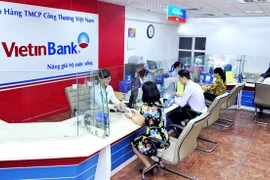 Vietcombank is one of the few banks to have met Basel II standards before the central bank's 2020 deadline.
Vietcombank is one of the few banks to have met Basel II standards before the central bank's 2020 deadline.(Photo: VNA)
Hanoi (VNS/VNA) - The capital adequacy ratio (CAR) of Vietnam's creditinstitutions has improved thanks to their increased equity.
The latest report from the State Bank of Vietnam (SBV) released last weekshowed the CAR of credit institutions had inched up to 11.80 percent at the endof February from 11.57 percent in the first month of 2019. Previously, the CARdropped from 12.14 percent at the end of 2018 to 11.57 percent in January 2019.
The CAR of State-owned commercial banks rose from 9.31 percent to 9.42 percent,commercial banks from 10.56 percent 10.76 percent and joint venture and foreignbanks from 23.53 percent to 24.67 percent.
According to experts, the rise was due to the increased equity of the creditinstitutions, of which the equity of private commercial banks posted thehighest rise of nearly 2.02 trillion VND (86.56 million USD) to more than 332.02trillion VND.
Despite the rise, the experts noted the CAR of domestic banks remained verylow, especially in State-owned commercial banks. Many local banks currentratios do not meet the CAR requirement of 8 percent under Basel II standards.
According to SBV regulations, from January 1, 2020, local banks will have tocalculate their CAR according to Basel II standards, which comprise minimumcapital requirements, supervisory review and market discipline issued by theBasel Committee on Banking Supervision with the goal of enhancing competitionand transparency and making banks more resistant to market changes.
Analysts from Fitch Group’s Fitch Solutions Macro Research said that althoughthe CAR of State-owned banks and joint stock commercial banks – which togetheraccount for 85 percent of assets in the banking sector in Vietnam – werealready at 9.3 percent and 10.6 percent, respectively, the calculation forrisk-weighted assets would be stricter under Basel II standard, which could seethe banks' CARs fall.
“We believe that banks will tighten lending towards riskier ventures inanticipation of the Basel II standards and this will weigh on loan growth,” theanalysts said.
Only seven banks – Vietcombank, VIB, OCB, MBBank, TPBank, VPBank and ACB – havebeen so far approved by the SBV to apply Basel II.There are still 28 banks thathave to race against time to meet the standards.
Fitch predicted that many Vietnamese banks, especially small ones, will facethe problem of undercapitalisation when the Basel II standards are implementeddue to more stringent calculation of risk-weighted assets. This could seeconsolidation in the sector involving smaller and weaker domestic banks mergingwith larger counterparts to attain the required capitalisation levels. – VNS/VNA





























